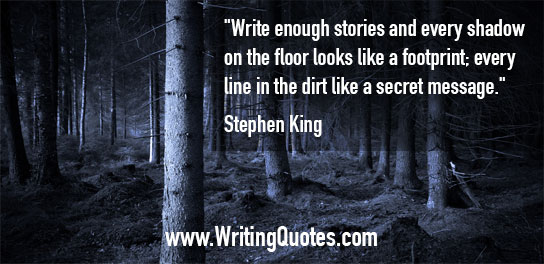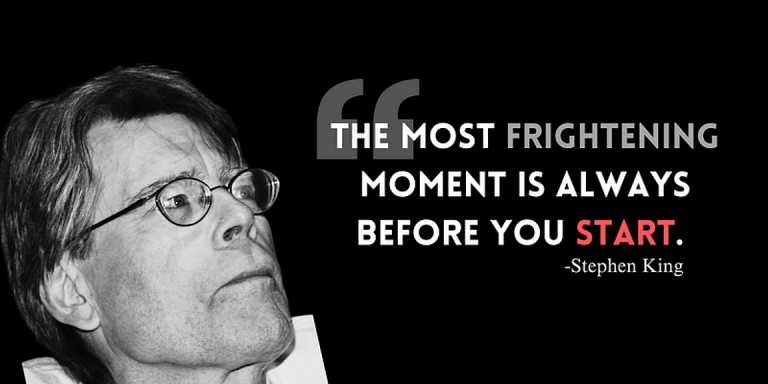Stephen King Quotes: Lessons In Building An Engaging Narrative
Stephen King Quotes: Lessons in Building an Engaging Narrative
If you’ve ever been captivated by a Stephen King novel, you know that his stories have a way of pulling you in and keeping you hooked until the very last page. But have you ever wondered what makes his narratives so engaging? Well, look no further. In this article, we’ll explore some of Stephen King’s most insightful quotes and discover the valuable lessons they hold for building an irresistible narrative.
When it comes to storytelling, Stephen King is a master. His words have the power to transport readers into the depths of his imagination, where they become fully immersed in his thrilling worlds. From his iconic horror novels like “It” and “The Shining” to his gripping dramas like “The Green Mile,” King’s ability to create a sense of suspense and anticipation is unparalleled. So, what can we learn from this literary genius? Let’s dive into some of his most memorable quotes and unlock the secrets to crafting a narrative that will keep your readers on the edge of their seats.

Stephen King Quotes: Lessons in Building an Engaging Narrative
Stephen King is a master storyteller known for his captivating novels and gripping narratives. His books have sold millions of copies worldwide, and his unique writing style has inspired countless aspiring writers. In this article, we will explore some of Stephen King’s most insightful quotes about building an engaging narrative. These quotes offer valuable lessons and advice for writers looking to create compelling stories that captivate readers from start to finish.
1. The Importance of Character Development
In Stephen King’s words, “I try to create sympathy for my characters, then turn the monsters loose.” This quote highlights the significance of character development in storytelling. To build an engaging narrative, writers must invest time and effort into crafting well-rounded and relatable characters. By creating sympathy and emotional connections with the characters, readers become more invested in their journeys and the challenges they face.
Character development involves exploring the backgrounds, motivations, and flaws of each character. King’s emphasis on turning monsters loose suggests that conflict and adversity are essential elements of a captivating narrative. By pitting well-developed characters against formidable challenges, writers can create tension and suspense that keep readers hooked.
Creating Complex and Multidimensional Characters
In addition to sympathy, Stephen King emphasizes the importance of creating complex and multidimensional characters. He states, “The most important things are the hardest things to say. They are the things you get ashamed of because words diminish them.” This quote encourages writers to delve into the complexities of human nature and explore the depths of their characters’ emotions and experiences.
By avoiding simplistic portrayals, writers can create more nuanced and realistic characters that resonate with readers. Characters should have strengths, weaknesses, and internal conflicts that mirror the complexities of real-life individuals. This level of depth adds layers to the narrative, making it more engaging and thought-provoking.
2. The Power of Description and Detail
Stephen King’s writing is known for its vivid descriptions and attention to detail. He believes that strong description is crucial for immersing readers in the story. King says, “Description begins in the writer’s imagination, but should finish in the reader’s.” This quote highlights the importance of creating imagery that allows readers to visualize the setting, characters, and events in their minds.
Effective description brings the narrative to life, engaging the reader’s senses and making the story more vivid. By using evocative language and carefully chosen details, writers can transport readers to the world they have created. This level of immersion enhances the reader’s experience and keeps them engaged throughout the narrative.
The Art of Show, Don’t Tell
Another aspect of King’s writing style is his mastery of the “show, don’t tell” technique. He advises writers, “Don’t tell me the moon is shining; show me the glint of light on broken glass.” This quote emphasizes the importance of using descriptive language to evoke emotions and create a sensory experience for the reader.
Rather than simply stating facts or emotions, writers should paint a picture with their words, allowing readers to draw their own conclusions and engage with the story on a deeper level. This technique adds depth and richness to the narrative, making it more engaging and memorable.
3. The Role of Fear and Suspense
Stephen King is renowned for his ability to create fear and suspense in his novels. He understands the power of these emotions in keeping readers engaged and turning pages. King states, “The scariest moment is always just before you start. After that, things can only get better.” This quote speaks to the importance of building anticipation and tension in a narrative.
By introducing fear and suspense early on, writers can hook readers and keep them invested in the story. The anticipation of what might happen next creates a sense of urgency and intrigue that compels readers to continue reading.
Building Suspense through Foreshadowing
One of the techniques Stephen King employs to build suspense is foreshadowing. He believes, “The best way to creep someone out is to give them hints of what’s coming, let them fill in the blanks themselves.” This quote underscores the power of suggestion and allowing readers to draw their own conclusions.
Foreshadowing creates a sense of unease and anticipation as readers piece together clues and try to anticipate what might happen next. It keeps them engaged and invested in the narrative, eagerly awaiting the resolution of the foreshadowed events.
4. The Importance of Revision and Editing
Stephen King recognizes that the writing process doesn’t end with the first draft. He advises, “To write is human, to edit is divine.” This quote emphasizes the importance of revision and editing in creating a polished and engaging narrative.
Revision allows writers to refine their ideas, tighten the plot, and improve the overall flow of the story. It enables them to identify and address any weaknesses or inconsistencies in the narrative, ensuring a more satisfying reading experience for the audience.
The Art of Self-Editing
In addition to the revision process, Stephen King emphasizes the importance of self-editing. He advises writers to eliminate unnecessary words and tighten their prose. King states, “Kill your darlings, kill your darlings, even when it breaks your egocentric little scribbler’s heart, kill your darlings.” This quote encourages writers to be ruthless in cutting out any extraneous or self-indulgent elements from their writing.
By streamlining the narrative and focusing on what truly matters, writers can create a more engaging and impactful story. Self-editing helps eliminate distractions and keeps the reader’s attention firmly on the core elements of the narrative.
Conclusion
In conclusion, Stephen King’s quotes offer valuable insights into the art of building an engaging narrative. From the importance of character development and vivid description to the role of fear and suspense, King’s wisdom provides valuable lessons for aspiring writers. By incorporating these lessons into their own writing, authors can create captivating stories that resonate with readers and leave a lasting impact. Whether you’re a seasoned writer or just starting on your writing journey, Stephen King’s quotes serve as a reminder of the power of storytelling and the art of crafting an engaging narrative.
Key Takeaways: Stephen King Quotes – Lessons in Building an Engaging Narrative
- 1. A captivating narrative hooks readers from the start.
- 2. Characters should be relatable and have depth to keep readers invested.
- 3. Effective use of suspense and tension keeps readers on the edge of their seats.
- 4. Descriptive and vivid imagery brings the story to life in the reader’s mind.
- 5. Mastering the art of pacing ensures the story unfolds at the right pace to maintain interest.
Frequently Asked Questions
Q1: What are some key lessons in building an engaging narrative according to Stephen King?
Stephen King is renowned for his ability to captivate readers with his narratives. Here are some key lessons he has imparted:
Firstly, King emphasizes the importance of creating relatable and believable characters. By giving his characters depth and complexity, readers become emotionally invested in their journeys.
Secondly, King advises writers to focus on storytelling rather than trying to impress with fancy prose. He believes that a strong narrative is built on the foundation of a compelling story, rather than flowery language.
Q2: How does Stephen King use quotes to enhance his storytelling?
Stephen King often uses quotes to add depth and richness to his storytelling. These quotes can come from a variety of sources, including popular culture, literature, and even his own previous works.
By incorporating quotes, King adds a layer of familiarity and relatability to his narratives. They can provide readers with a sense of nostalgia, or serve as a reference point that enhances the overall reading experience.
Q3: How does Stephen King maintain suspense and tension in his narratives?
One of Stephen King’s greatest strengths as a writer is his ability to maintain suspense and tension throughout his narratives. He achieves this through various techniques:
Firstly, King carefully builds anticipation by gradually revealing information to the reader. This keeps them engaged and eager to uncover the mysteries within the story.
Additionally, he creates a sense of unease by incorporating elements of the supernatural or the unknown. By introducing elements that challenge the boundaries of reality, King keeps readers on the edge of their seats.
Q4: How does Stephen King create a sense of horror and fear in his writing?
Stephen King is known for his ability to evoke feelings of horror and fear in his readers. He achieves this through several techniques:
Firstly, King taps into universal fears and anxieties that resonate with readers. Whether it’s the fear of the unknown, the fear of loss, or the fear of the supernatural, he explores these themes in a way that strikes a chord with his audience.
Secondly, King masterfully crafts vivid and detailed descriptions of terrifying scenes. His ability to paint a picture with words allows readers to visualize the horrors within his stories, intensifying their emotional response.
Q5: What can writers learn from Stephen King’s approach to building an engaging narrative?
Stephen King’s approach to building an engaging narrative offers valuable lessons for writers:
Firstly, he emphasizes the importance of authenticity and relatability. By creating characters and situations that readers can connect with, writers can forge a strong emotional bond with their audience.
Secondly, King highlights the power of storytelling. By prioritizing a strong narrative, writers can captivate readers and keep them invested in the story’s progression.
10 Writing Tips from Stephen King for Writers and Screenwriters
Final Summary: Lessons in Building an Engaging Narrative
And there you have it, folks! We’ve taken a deep dive into the world of Stephen King quotes and uncovered some valuable lessons in building an engaging narrative. From the importance of relatable characters to the power of vivid descriptions, King’s wisdom has truly resonated with us.
One of the key takeaways from our exploration is the significance of crafting a strong opening. As King himself once said, “An opening line should invite the reader to begin the story. It should say: Listen. Come in here. You want to know about this.” This nugget of wisdom reminds us that the beginning of our story sets the tone and hooks the reader from the very first sentence.
Another valuable lesson we’ve learned is the importance of embracing the unexpected. As King famously stated, “I try to create sympathy for my characters, then turn the monsters loose.” This reminds us that adding unexpected twists and turns can elevate our narratives and keep readers on the edge of their seats.
In conclusion, Stephen King’s quotes offer us a treasure trove of wisdom when it comes to building an engaging narrative. By applying his lessons, we can captivate readers, create unforgettable characters, and craft compelling stories that will stand the test of time. So, go forth and let your imagination run wild, for as Stephen King once said, “Books are a uniquely portable magic.”





